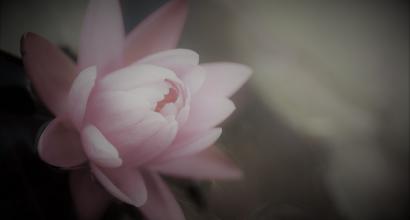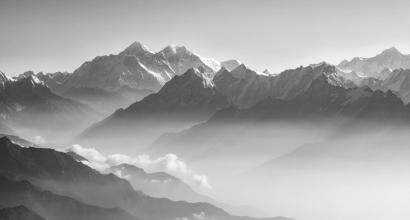Appendix 5. Vyavasāya (Sustained effort)
vyavasāyātmikā buddhirekeha kurunandana || (2.41)
Here vyavasāya refers to sustained effort or continuous industry focused on a single goal. That is penance (tapas). A person needs to be of a single-pointed mind to satisfy any immense objective. If, on the other hand, his mind were to vacillate from one side to another every moment, none of his efforts would go very far.
80 or 90 percent of us need to learn this lesson. Multiple objects of this world attract them. But they get fascinated by each one of those attractions and end up without satisfaction in any of them.
When a teacher listens to exquisite music, he thinks - “Ah! What a wretched job I have! If only I were a musician”. The musician longs after the legal profession. The lawyer is interested in medicine. The doctor on the other hand wants to try his hand at business. The same person when listening to the radio in the morning feels - “Aha! If I had learnt music!”. When he sees a civil servant in a cavalcade of cars, he exclaims - “I should have done my IAS!”. When, in the afternoon, he sees rich lawyers depositing money in the bank, he greedily admires the legal profession. When he sees the interminable queue and the fans in a movie theatre the yearning becomes - “Had I been an actor!”. This is the fate of many. They lack respect for what they have but regard what they do not possess very highly. This is a sure path towards spoiling one’s life.
The one who is desirous of leading a meaningful life must first fix up a goal in his mind. With the goal decided, he must pursue it without letting go. He should not get fascinated by everything he sees and lose his mind.
Good in this world is of many a kind. Pleasures are myriad. Tastes are teeming. Attractions are endless. All of them cannot be enjoyed by a single person. He might get to enjoy but a few of them. But he should not give up on his goal because of them. When he gets a whiff of fried snacks from a neighbouring house while on a walk, he must not forget that food must be cooked in his own kitchen. He should not forget that he has his own family when he listens to a pleasant melody from someone’s dwelling. He must forever keep his goal in his sights and constantly strive towards it. Arjuna was a kṣatriya. His chief goal was to protect dharma. If he set that goal aside and thought - “I will be a mendicant. I will campaign for animal welfare. I will be a nurse in a hospital. I will do bhajan in a temple”, it would not be dharma; but a deficiency in it.
When a person wants to set a considered goal, those around him say different things and confuse him. “Oh! What’s in a BA?” - exclaim the neighbours of a family wanting their boy to study for a BA. “Why? Can’t they afford to make him a B.E.?” - object the other neighbours. “You should go in for at least a B.Sc.” - avers the third set of neighbours. The mind dithers.
My friend was building a house. Five or six of us used to walk every morning in front of the construction site. Someone amongst us would proffer a suggestion every single day. One day I said, “The window should have been bigger”. The next day another opined, “The door now looks smaller in proportion to the window”. The third averred, “You should probably tile the roof”. Another continued on another day, “A concrete roofing is better for such a house”. The owner of the house would listen to all these suggestions with a smile. We went there after twenty such days. No suggestion would come forth that day. “Don’t you have any suggestions today?” he asked us beaming. “Whose suggestion should I have followed? If I had followed all your suggestions, even the walls of the house would not have risen” - he finally declared.
bahu-śhākhā hyanantāśhcha buddhayo’vyavasāyinām | (BG 2.41)
The intellects of the faltering are many-branched and endless.
This is the fate of those who do not know their own mind. The individual firms up when the goal is known. This brings repose to the mind. Such a mind becomes capable of achieving the goal. Therefore, if life has to become meaningful, the first undertaking is deciding upon the goal. Once the goal is decided, one must not change directions frequently. One must not give his ears to those on this side and that. Arjuna had done so. He was taken in by others’ words and became confused. Therefore, Bhagavān chided him
“prajñāvādāṃśca bhāṣase ॥ (BG 2.11) -
You utter these words of ‘wisdom’!
śrutivipratipannā te ॥” (BG 2.53) -
When your intellect is uncertain because of the words of the śruti that show multiple possibilities.
and corrected him. “Your intellect has lost faith by listening to others words and is agitated”. This is a caution to all of us.
~
ದುರಿತದ ತನುಪಂಜರಮಂ
ಮುರಿದಲ್ಲದೆ ಜೀವಪಕ್ಷಿಗೂರ್ಧ್ವಸ್ಮರಣಂ
ದೊರೆಕೊಳದು ಧರ್ಮಯುದ್ಧದಿ
ಮರಣಂ ತತ್ತರಣಮದುವೆ ದೈವವಿಧಾನಂ ।। 1
Without breaking the body-cage
of the tendency towards evil,
the jīva-bird will not attain higher progress.
Thus, in the battle for dharma,
death is a path to progress.
That is Divine decree.
ಜಗದಿಂ ತಾನುಂ ತನ್ನಿಂ
ಜಗಮುಂ ಕೆಡದವೊಲಿರುತ್ತಲವರನ್ಯೋನ್ಯಮ್ ।।
ಮಿಗೆ ಸಾಹ್ಯಮಾಗಿ ಜೀವ-
ಪ್ರಗತಿಯ ಗಳಿಪಂತೆ ಬಾಳನಾಳ್ವುದೆ ಧರ್ಮಮ್ ।। 2
This symbiotic synergy that
sustains the jīva and the world
without harming one another (and)
the way of life that helps the world
while ensuring the progress of the jīva
is dharma.
ಇಂದ್ರಿಯದೆ ಜಗಜ್ಜ್ಞಾನಂ
ತಂದ್ರಿತಮಿಂದ್ರಿಯದಿನಪ್ಪುದಾತ್ಮಜ್ಞಾನಂ ।।
ಸಾಂದ್ರವಿವೇಕದಿನಾಳ್ವಂ-
ಗಿಂದ್ರಿಯಮಹುದುಚಿತಭೃತ್ಯನುಭಯಹಿತಾರ್ಥಂ ।। 3
The knowledge of the world is from the senses.
However, Self-knowledge is affected because of these sense organs.
For him who rules with wisdom and discernment,
sense organs become useful servants
and help attain the knowledge of the world and the Self.
ಹಯದಿಂದಿಳಿಯದೆ ತೋತ್ರ-
ಪ್ರಯುಕ್ತಿಯಿಂ ಸುಗಮಗೊಳಿಪ ಪಟುಸಾದಿಯವೋಲ್ ।
ಜಯಿಪುದು ಕೊಲ್ಲದೆ ನಾಮಿಂ-
ದ್ರಿಯಗಳನೊಡೆತನದಿನಿಳಿಯದೂಳಿಗಕೆಂದಂ ।। 4
Just as the skilled horseman makes his path easy with the whip,
without alighting from his horse,
it is prudent to employ sense organs without killing them.
by winning them over.
ನಿಖಿಲಜಗದಸಂಗಂ ಜೀವಲೀಲಾಪ್ರಸಂಗಂ
ವಿಷಯನಿಗಳಭಂಗಂ ಜ್ಞಾತಭೂತಾಂತರಂಗಮ್ ।
ಪ್ರಣಯರಸತರಂಗಂ ಪಾಪತೂಲಸ್ಫುಲಿಂಗಮ್
ಮನುಜಹೃದಯಲಿಂಗಂ ಕೇಶವಂ ಮಂಗಳಾಂಗಮ್ ।।
Unassociated with all the world
the author of this Divine Comedy,
who destroys the fetters of sense objects,
who knows the inner thoughts of beings.
the wave of the rasa of love,
the spark that burns the cotton-rag of sin.
one who resides in the heart of man,
Keśava (Kṛṣṇa) is the epitome of auspiciousness.
Chapter 2 Concludes.
The present series is a modern English translation of DVG’s Kendra Sahitya Akademi Award-winning work, Bhagavad-gītā-tātparya or Jīvana-dharma-yoga. The translators wish to express their thanks to Śatāvadhāni R Ganesh for his valuable feedback and to Hari Ravikumar for his astute edits.

















































